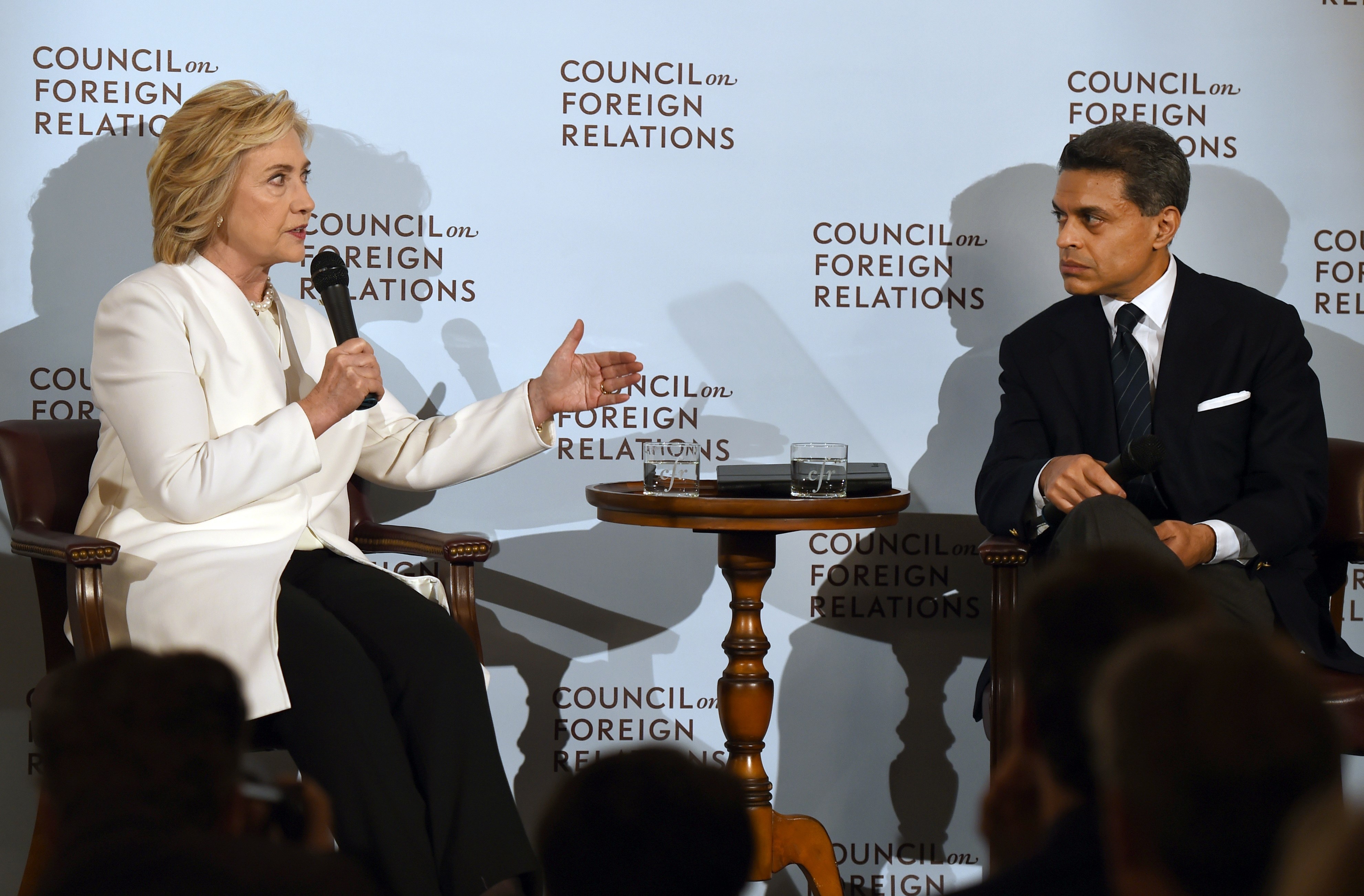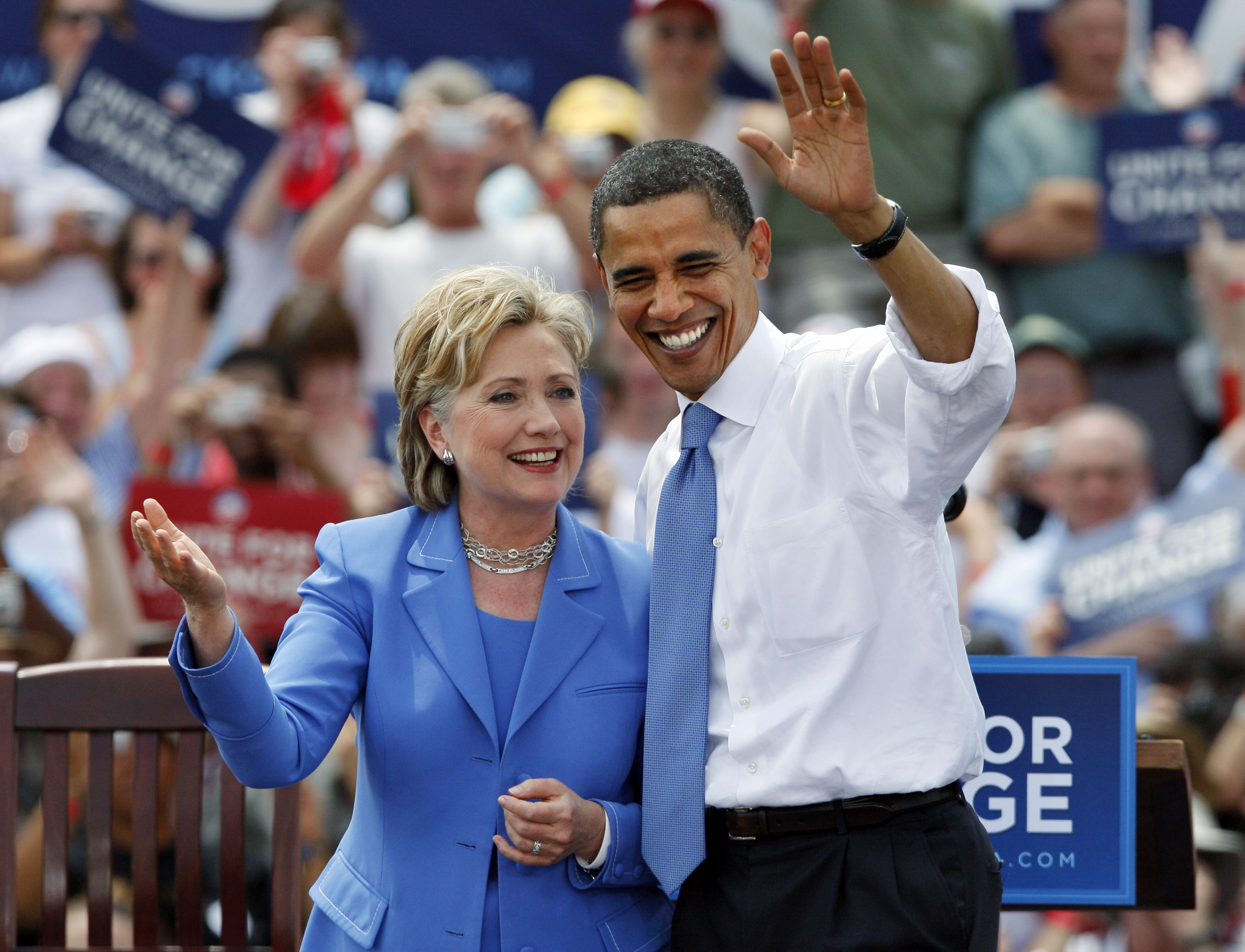NEW YORK — Hillary Clinton laid out a broad agenda Thursday for confronting the Islamic State terrorist network — and sent a larger signal that she intends to be a more aggressive commander in chief than President Obama, under whom she served as secretary of state.
The front-runner for the 2016 Democratic presidential nomination also portrayed the United States as the leader of a global fight to exterminate the Islamic State and other terrorist threats. She doubled down on her call for a no-fly zone to protect Syrian civilians.
Clinton’s prescriptions — which are hawkish and more specific than either her Democratic or Republican rivals have set out — could raise discomfort in liberal circles and among Americans made wary by the long wars in Afghanistan and Iraq.
Her comments suggested that she is looking past her primary opponent, Sen. Bernie Sanders (Vt.), and positioning herself for a general-election battle against whomever the Republican party puts forward.
She also indicated that hers will be a different brand of leadership than that of Obama, who has been roundly criticized for a declaring shortly before last week’s attacks in Paris that the Islamic State had been “contained.”

Clinton, in contrast, said the threat is an urgent one.
As secretary of state, she lost a policy struggle within the Obama administration about whether to intervene by arming and training Syrian rebels in 2011 and 2012, before the group also known by the acronyms ISIS and ISIL emerged as a potent threat.
“ISIS is demonstrating new ambition, reach and capabilities,” she said in a speech before the Council on Foreign Relations. “Our goal is not to deter or contain ISIS, but to defeat and destroy ISIS.”
“Time is of the essence,” Clinton added.
Recent history teaches that sending a large U.S. ground force “is just not the smart move,” she said, although she described a wider and deeper U.S. military commitment than Obama has yet to mount.
Her repeated calls for the United States to take the global lead marked a change in emphasis.
As recently as Saturday, during a Democratic presidential candidate debate in Des Moines, Clinton had said: “It cannot be an American fight. And I think what the president has consistently said — which I agree with — is that we will support those who take the fight to ISIS. . . . This cannot be an American fight, although American leadership is essential.”

In her speech Thursday, Clinton described a more ambitious and prominent role for the United States: “No other country can rally the world to defeat ISIS and win the generational struggle against radical jihadism. Only the United States can mobilize common action on a global scale.”
Clinton set out a strategy to defeat the Islamic State militants who have taken over portions of Syria and Iraq; dismantle the terrorist infrastructure that allows the militants to recruit, propagandize and raise money across borders; and harden U.S. and allied defenses.
The former secretary of state was unsparing in criticizing U.S. allies Turkey and Saudi Arabia, along with Qatar and other Gulf Arab states, for facilitating extremism or looking the other way.
“Our efforts will only succeed if the Arabs and Turks step up in a much bigger way,” Clinton said. “This is their fight, and they need to act like it.”
She was toughest on Turkey, a NATO ally. Turkey must finally seal its border with Syria, over which most jihadi recruits cross, and stop bombing Kurdish rebel forces fighting the Islamic State, Clinton said.
Republicans have seized on Clinton’s refusal to say that the enemy is “radical Islam,” calling her phrasing at the debate weak-kneed. Democratic rivals Sanders and Martin O’Malley also declined to adopt terminology that directly links recent terrorist attacks to Islam.
In her speech, Clinton said the enemy is “jihadism,” not Islam, and that those who “obsess” over what label to place on the terrorists actually give “these criminals, these murderers more standing than they deserve.”
The terrorist attacks in Paris, as well as recent attacks in Beirut, Nairobi and perhaps Egypt, could make Clinton’s foreign-policy credentials more of an electoral asset.
Republicans, however, say that her résumé is also a liability.
“Hillary Clinton can’t walk away from President Obama’s failing ISIS strategy, because she helped craft it and even praised it,” Republican National Committee spokesman Michael Short said.
Meanwhile, Sanders gave his own speech Thursday in which he recalled Clinton’s support for the “ill-conceived” 2003 invasion of Iraq, which he said led to the destabilization of the Middle East.
“I’m not running to pursue reckless adventures abroad, but to rebuild America’s strength at home,” the Vermont senator and self-described democratic socialist said. “I will never hesitate to defend this nation, but I will never send our sons and daughters to a war under false pretense.”
Clinton is alone among the Democratic presidential candidates in calling for a no-fly zone, long requested by U.S.-backed rebels fighting both the Islamic State and the regime of Syrian President Bashar al-Assad. The White House has resisted the idea as highly risky, while Republican presidential candidates such as former Florida governor Jeb Bush and Sen. Marco Rubio (Fla.) support it.
Thursday’s address included Clinton’s most detailed discussion of the proposal for a protective strip along the Turkish border that she likened to the allied no-fly zone in Iraq after the Gulf War.
She also prescribed “a more effective coalition air campaign, with more allied planes, more strikes and a broader target set.”
The administration Clinton served until 2013 has edged into greater military involvement since she left office, approving limited airstrikes against the Islamic State last year and a small number of Special Operations advisers on the ground this fall.
Clinton has supported those moves as a candidate but went much further Thursday. In an exchange with moderator Fareed Zakaria, a Washington Post columnist and CNN host, she characterized her ideas as an expansion of Obama’s policies.
“I have made clear that I have differences, as I think any two people do,” she said.
Some experts said her approach would amount to more than an intensification of current efforts.
“Both in tone and content, she made it very clear in this speech that she would be much more than a continuation of Barack Obama,” said William A. Galston, a senior fellow at the Brookings Institution who was a senior policy adviser to Clinton’s husband, former president Bill Clinton.
Galston said Thursday’s speech signaled that Hillary Clinton’s style in managing foreign policy would be more like that of former president George H.W. Bush. She would “roll up her sleeves — not only lay down the policy, but be involved with implementing it on the high levels that would be required,” Galston said.
Clinton echoed Obama in defending the resettlement of Syrian refugees in the United States. Republicans among the 2016 field and in Congress and state houses have sought to bar refugees, at least temporarily, for fear that terrorists might be among them.
“Turning away orphans, applying a religious test, discriminating against Muslims, slamming the door on every single Syrian refugee — that is just not who we are,” Clinton said. “We are better than that.”
Before the Paris attacks, Clinton had said the United States should vastly expand its Syrian refugee program to bring in 65,000 annually. Obama has set a far more modest goal of 10,000 a year, but even that would be a major change. Only about 2,000 refugees have been resettled in the United States to date, mostly because of stringent vetting and anti-terrorism paperwork requirements.
Officials in at least 30 states have said they would resist any new refugee relocations until adequate safeguards are put in place to screen people for possible terrorist links.
- Publish my comments...
- 0 Comments
